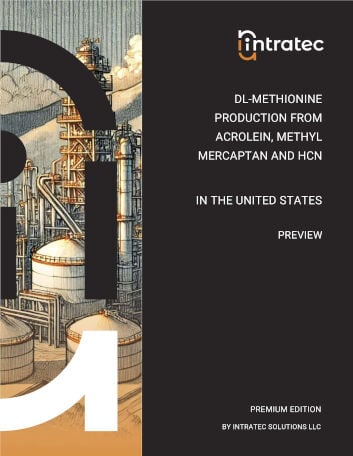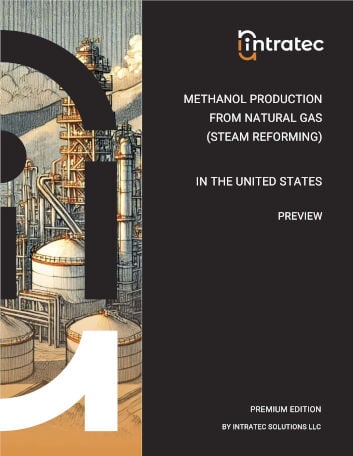Commodity Production Costs Report
Methyl Mercaptan from Natural Gas, Sulfur and Methanol (H2 Intermediate)
Methyl Mercaptan Plant Capital & Operating Cost Analysis | United States | Q4 2025
This report presents the economics of Methyl Mercaptan (MSH) production from natural gas, sulfur, and methanol. In this process, hydrogen is produced from natural gas via a partial oxidation process and then is reacted with sulfur to produce hydrogen sulfide. Finally, hydrogen sulfide and methanol are reacted to produce Methyl Mercaptan.
The report provides a comprehensive study of Methyl Mercaptan production and related Methyl Mercaptan production cost, covering three key aspects: a complete description of the Methyl Mercaptan production process examined; an in-depth analysis of the related Methyl Mercaptan plant capital cost (Capex); and an evaluation of the respective Methyl Mercaptan plant operating costs (Opex).
The Methyl Mercaptan production process description includes a block flow diagram (BFD), an overview of the industrial site installations, detailing both the process unit and the necessary infrastructure, process consumption figures and comprehensive process flow diagrams (PFD). The Methyl Mercaptan plant capital cost analysis breaks down the Capex by plant cost (i.e., ISBL, OSBL and Contingency); owner's cost; working capital; and costs incurred during industrial plant commissioning and start-up. The Methyl Mercaptan plant operating costs analysis covers operating expenses, including variable costs like raw materials and utilities, and fixed costs such as maintenance, labor, and depreciation.

Hydrogen Synthesis. In a partial oxidation (POX) reactor, natural gas is partially oxidized with air, forming carbon monoxide and hydrogen, with steam added to promote a CO shift reaction that generates additional hydrogen and carbon dioxide. Next, a water-gas shift is promoted by adding more steam to the POX reactor outlet stream, reacting with the remaining carbon monoxide to produce more hydrogen and carbon dioxide. Water is removed via condensation, and carbon dioxide and other impurities are removed using a pressure swing adsorption (PSA) system, leaving pure hydrogen to be used for H2S production.
H2S Synthesis. In a packed bed reactor, hydrogen is bubbled into molten sulfur, forming a reaction mixture that passes through a catalyst bed, generating H2S. The stream leaving the reactor is quenched, then cooled in heat exchangers to recover vaporized sulfur. The H2S proceeds to methyl mercaptan synthesis.
Methyl Mercaptan Synthesis. First, vaporized methanol is mixed with H2S to form a feed stream with the desired molar ratio. The mixture is then preheated and fed to a packed bed tubular reactor where it reacts to form methyl mercaptan (MSH) and water. The reactor effluent is cooled and sent to the purification stages.
Methyl Mercaptan Separation. The reactor effluent is first condensed, creating an organic and an aqueous condensate; the uncondensed stream being washed with methanol, which is then mixed with the aqueous condensate. Unreacted H2S is recycled to the MSH Synthesis reactor feed. Both condensates undergo distillation to recover Methyl Mercaptan, methanol, and remove impurities. Methyl mercaptan is further distilled, separating it from dimethyl sulfide and other components. The purified MSH is then stored as the final product.
Report in PDF Format
Download & Explore Anytime
Access in Various Devices
Print & Read Comfortably
Share With Co-workers
Up-to-date Report
Professional report based on Q4 2025 economic data, ensuring timely evaluations.
Multiple Use Cases
Ideal for investment screening, feasibility studies, cost estimates, and research planning.
Proven Methodology
Developed using a consistent methodology honed over a decade, ensuring reliable cost analyses.
Report Editions
Content Highlights
Plant Capital Cost Summary
Summary outlining the capital cost required for building the Methyl Mercaptan production plant examined.
Plant Capital Cost Details
Detailing of fixed capital (ISBL, OSBL & Owner’s Cost), working capital and additional capital requirements.
Plant Cost Breakdowns
Breakdown of Methyl Mercaptan process unit (ISBL) costs and infrastructure (OSBL) costs; plant cost breakdown per discipline.
Operating Costs Summary
Summary presenting the operating variable costs and the total operating cost of the Methyl Mercaptan production plant studied.
Operating Cost Details
Detailing of utilities costs, operating fixed costs and depreciation.
Plant Capacity Assessment
Comparative analysis of capital investment and operating costs for different Methyl Mercaptan plant capacities.
Production Process Information
Block Flow Diagram, descriptions of process unit (ISBL) and site infrastructure (OSBL).
Process Consumptions
Raw materials and utilities consumption figures, by-products credits, labor requirements
Process Diagrams
Process flow diagrams (PFD), equipment list and industrial site configuration
Other Methyl Mercaptan Production Cost Reports

Methyl Mercaptan Production from Hydrogen Sulfide and Methanol
This study presents the economics of Methyl Mercaptan production from hydrogen sulfide and methanol in the USA. In this process, hydrogen sulfide and methanol are reacted to produce Methyl Mercaptan.
Details: 50 kta United States-based plant | Q4 2025 | 107 pages | Issue B | From $999 USD

Methyl Mercaptan from Natural Gas, Methanol and Sulfur (Carbon Disulfide Co-Product)
This study presents the economics of Methyl Mercaptan production from natural gas, methanol and sulfur in the USA. In this process, sulfur and natural gas are reacted to produce hydrogen sulfide and carbon disulfide. Subsequently, hydrogen sulfide and methanol are reacted to produce Methyl Mercaptan.
Details: 50 kta United States-based plant | Q4 2025 | 107 pages | Issue A | From $1,499 USD
Bundle & Save
Purchase multiple Methyl Mercaptan Production Cost reports and enjoy tiered discounts
up to 20% off!
Could Not Find the Report You Need?
Obtain a Bespoke Report
Get a report targeting the process in which you are interested
See Offer Details
Understand Bespoke Reports and how you can easily order them
Check Editions & Pricing
Complete a brief form and see a quotation for your Bespoke Report
Other Related Production Cost Reports

Methanol Production from Natural Gas (Combined Reforming)
This study presents the economics of large-scale Methanol production from natural gas in the United States. In this process, natural gas is first converted into synthesis gas (syngas) by means of conventional steam reforming and secondary autothermal reforming. Then, the syngas is converted into Methanol.
Details: 1700 kta United States-based plant | Q4 2025 | 107 pages | Issue B | From $799 USD

DL-Methionine Production from Acrolein, Methyl Mercaptan and HCN
This report presents the economics of DL-Methionine production from acrolein, methyl mercaptan, and hydrogen cyanide (HCN) in the United States. In this process, refined acrolein and methyl mercaptan are reacted to form MMP (also called methional), which is further reacted with HCN to generate DL-Methionine via a typical carbonate process.
Details: 150 kta United States-based plant | Q4 2025 | 107 pages | Issue D | From $1,199 USD

Methionine Hydroxy Analog from Acrolein, Methyl Mercaptan and HCN
This study presents the economics of Methionine Hydroxy Analog production from acrolein, methyl mercaptan, and hydrogen cyanide (HCN) in the United States. In this process, acrolein and methyl mercaptan are reacted to form methional. The methional reacts with HCN to produce hydroxy methylthiobutyronitrile (HMBN) intermediate, which is hydrolyzed to Methionine Hydroxy Analog.
Details: 150 kta United States-based plant | Q4 2025 | 107 pages | Issue F | From $1,199 USD

Methanol Production from Natural Gas (Steam Reforming)
This study presents the economics of large-scale Methanol production from natural gas in the United States. In the process examined, natural gas is first converted into synthesis gas (syngas) by means of conventional steam reforming and then the syngas is converted into Methanol.
Details: 1000 kta United States-based plant | Q4 2025 | 107 pages | Issue A | From $799 USD
+800 Reports Developed, Targeting +250 Commodities
Vast Report Library
858 independent and up-to-date reports examining embryonic and established production processes.
Free Sample Reports
Quickly understand the structure and depth of content of our professional reports.

